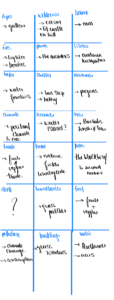Experience and the environment; research workshop and debate (W3)
Hey, me again!
This week we continued the exploration of the relationship between the human experience and the environment and I particularly enjoy the different tasks we carried out this week and how collaborative they were. In preparation for Thursday I researched into the debate question and the arguments for (as that is the group I was assigned in). I also researched into its meaning specifically in the field of interior design.
After the lecture on Thursday morning we got split into pairs to have a closer look at some of the different elements of our surrounding environment and their entanglements with nature and culture. It was quite a tricky exercise as we had to think more deeply about everyday things that we don’t usually think twice about. It was funny to observe how nature is culturally so immersed in our ways of designing and more broadly in our ways of living but yet how far apart humanity and nature can be placed sometimes. It was also interesting to see how different elements, like for example pubs, meant to s, my pair being from England and I from Belgium.
Figure 1: Answers from morning workshop.

The debate that took place during the seminar in the afternoon was also super interesting. Before we started, we got into our groups, mine was ‘for’, and gathered our arguments and what it meant to each of us personally in our field of study. We opened the debate by saying that even though there has been a collective intention to be more careful of environmental impact in recent years, the solutions implemented so far have been very superficial. We argued that, in the society we live in today, profit and the planet are unfortunately positioned against each other. Design for the environment will not make good profit, and design for profit will be bad for the environment. We argue that it is hard to make the consumerist world we live in today more sustainable and that the right approach would be to go back to our foundation and the roof ideas we have of what design means. The other side of the room, the ones ‘against’ the debate prompt, argued that companies are making real efforts that should not be neglected and that we are actually in an age where we are being more conscious about the environment than we ever have been. I did agree with some of the things that they were saying but still believe that the approach we are taking today is too superficial, and often not even real (greenwashing!). We used the example of Patagonia’s recycled cotton and polyester shirts that are advertised as being sustainable but that quite limited as that recycled piece of garment is actually not recyclable anyone after that (cotton and polyester are too hard to separate to be recycled again). This is example shows what I believe our problem is; our inability to see the bigger picture. Referring back to the Environmental Histories of Design article from last week, the physical is not just about bringing forth products, but it also, and most importantly, conditions life practices and shapes society (Ramia Maze). We need to be better at considering the environmental impacts that not only the production, consumption and disposal of design has but also the habits they create, the values they promote and the sustainable or unsustainable ethics they advertise.
At the end of the debate it was very interesting to see that majority of the class actually agrees with the debate argument (even if they were in the ‘against’ group) and we all agreed that it is a shame that, even today, environmental design is not a bigger part of our studies. It is a shame that it is just an optional course and not a priority in our project briefs. I hope this changes soon and I hope to be part of the change.
I look forward to more debates like this.
Speak to you soon!
Bibliography:
Deleted: Fallan, K. and Jørgensen, F.A. (2017). Environmental Histories of Design: Towards a New Research Agenda. <i>Journal of Design History</i>, 30(2), pp.103–121. doi:https://doi.org/10.1093/jdh/epx017.
Figure 1: Noel, E. (2024a). Answers from Morning Workshop. own work.